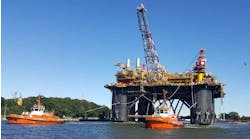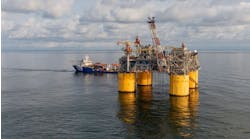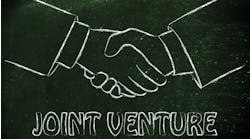Project activity is slowly picking up in the Dutch North Sea, following a largely uneventful couple of years. The main impetus is coming from the second tier of gas field operators, with both Wintershall and Gaz de France launch-ing new projects. But as elsewhere in northwest Europe, new players are needed to hasten the pace.
"We have had a few independents coming in, says Hans De Boer, managing director of the Dutch oil and gas suppliers association IRO. "ATP took over some of NAM's concessions, and they are really working hard to establish themselves here. More recently, CH4 acquired ENI's operating interest in the Markham gas field on the Dutch/UK median line.
"Last month, when IRO exhibited at the Global Petroleum Show in Calgary, I had a very interesting meeting with the CEO of Vermilion. They have taken on a package of gas concessions from Total, mostly onshore but with some just offshore in the north of our country."
Another Calgary-based company, Petro-Canada, already operates one offshore oilfield, Hanze, in the Dutch North Sea, and is looking shortly to develop a larger one, called De Ruyter.
According to De Boer, most of the new intake are monitoring government-industry discussions in The Netherlands concerning future fiscal policy. Most contentious was the new administration's decision to rescind a popular tax-break on investments – "depreciation at will" – in 2003.
"IRO has been lobbying the government over this issue for two years," De Boer says, "but the only commitment they gave us was that after a two-year trial period [ending December 2004], they would evaluate the situation, and perhaps reconsider their decision. Following the subsequent downturn in new offshore activity, we convinced the Ministry of Economic Affairs that this clause should be removed, and that the evaluation should come a lot sooner. The new Finance Minister has also agreed on an early evaluation, and according to our operators' association Nogepa, this process should start shortly. There are no promises as yet, but I'm a lot more positive than I was a couple of months ago."
The picture is broadly similar in the Norwegian sector – a few new projects in prospect, but also uncertainty over the government's tax intentions. Nevertheless, IRO has sold out of space at ONS Stavanger, where 17 member companies will be exhibiting. Others will be present at their own booths.
"The Norwegians are quite protective in their contract awards," De Boer says, "but some of our companies have been successful in the Norwegian sector, such as Boskalis, Heerema, and Van Oord Offshore, which will perform rock dumping on some of the Ormen Lange pipelines."
To help more of its members make a breakthrough, IRO, in association with the Dutch embassy in Oslo and a local agent, has set up a "matchmaking" program with potential clients and partners in Norway. "Most of our interested companies are in fabrication and construction, such as BAM Steel Structures, Genius Vos and Stork."
Typically, IRO attends seven or eight major oil and gas trade shows each year, depending on the level of support from its members and, to a lesser extent, from the Dutch government. These are only available for events in "emerging" E&P countries where Dutch suppliers are not well established. Favored events this year include Rio Oil & Gas and KIOGE in Kazakhstan, held simultaneously during the first week of October.
"We've attended the Rio show for 12 years," De Boer points out. "We have introduced Dutch companies to potential local partners in Brazil, and we also have good contacts there via the Dutch Consulate. Although the Brazilians are more and more keen on doing things in their own country, there are still opportunities for our members. Some of our successful companies in this market include Bluewater and Vrijhof, which have supplied equipment to Petrobras for FPSOs. Future Pipe, which manufactures fiberglass pipe, is thinking of setting up a factory with a local company.
"We have also attended the KIOGE show each year since 2000. We expect to have around 10 companies this time, which is a little disappointing bearing in mind that we started out with 17 for the inaugural event. But that may be because some Dutch companies are exhibiting independently. In general, there's a preference in Holland to seek work in Kazakhstan over Azerbaijan.
"We were approached by Agip KCO, through their office in Holland, for assistance with the Kashagan offshore project. Our more active companies in this part of the Caspian are Wagenborg, which provides supply vessels and barges; Boskalis, which has a contract for dredging and protection works offshore, and Global Safety Group, which includes the Maritime Training Centre in Rotterdam. They are setting up their own division in Kazakhstan to train local personnel."
Following this year's OTC, where IRO had the biggest national pavilion (27 booths occupying just over 1,000 sq m) representatives from 16 of the companies accompanied De Boer on a plane to Mexico City.
"This was our first ever trade mission to this country," he says. "We had a lot of meetings with people from departments of Pemex, and in general, our members were very pleased with the contacts they made. We also got a lot of information from the Mexican Ministry of Energy. And some of our members had scheduled meetings with local companies that might in future act as their partners or agents in Mexico."
De Boer hopes to follow up by taking an IRO group next February to the E-Exitep offshore/onshore show in Vera Cruz. Pemex's more pressing requirements include technologies related to LNG and reduced gas flaring, De Boer says.
"One of our more active companies investigating new solutions is IHC Gusto Engineering. They are looking at a design for an LNG FPSO, while their parent company IHC Caland is working on smaller projects involving floating LPG units. Natural gas extraction will become increasingly more important in the future. For that reason, we are looking to set up a new Gas Group within IRO, to study future gas and LNG projects."
Another IRO initiative, the Offshore Wind Energy Group, is "still dragging on", as De Boer puts it. "Two big development projects have been proposed offshore Ijmuiden, but neither have had the green light to proceed. Both groups had hoped to start construction this April. One is still waiting for permits, the other for subsidies from the Dutch government. These are needed, because offshore wind energy is not profitable without financial support."
"Rules and regulations have always been a hassle in Holland," he adds, "due to pressure from environmental groups. They claim that offshore wind farms create horizon pollution, or that all herrings in the area will get seasick from vibrations in the seabed."




